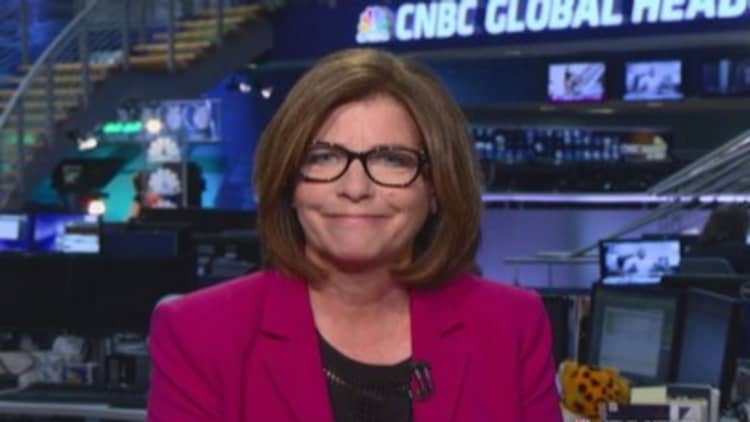
Stocks sold off on concerns about the global economy, but the real worry for the market is the second-quarter earnings season.
The selloff was sparked by worries about insolvency at a Portugese bank and global growth concerns after a stream of negative data. This comes after the Federal Reserve announced an end date of October for its bond buying program, formalizing what markets had expected.
The Dow opened sharply lower, with an 180 point or 1 percent decline, but recovered more than half its losses to close down 70 at 16,915. That was the biggest reversal for the Dow since June, 2013. The S&P 500 was off 8 at 1964, and the Nasdaq finished 22 lower at 4396. The Russell 2000 was the worst performer, down 1 percent to 1161.
"I don't think people are too enthused to commit new money up here. I also don't think they want to sell," said Jones Trading chief market strategist Michael O'Rourke. "We've gone up 10 percent since mid-April and today was the biggest pullback we had in the last couple of months and we can't even stay down 1 percent. There definitely was some dip buying. It's not like we hit any point where there was panic selling."
O'Rourke said trading volume was about normal. "Usually, on a big down day, volume is 20 percent higher than the average," he said.
Overnight, weaker-than-expected Chinese exports and a stunning 19.5 percent drop in May Japanese machine orders stoked concerns that growth is not picking up as expected. Surprising declines in industrial production in France and Italy added to the unease, and French inflation fell to its lowest level since the recession. Investors flocked to the safety of gold, U.S. Treasurys and German bunds, while tossing stocks and peripheral European debt, including Portugese, Italian, Spanish and Greek bonds.
The Dow saw its worst intraday point drop since May 15, when it plunged 216 points. The Dow pared its losses in morning trading, as did the , the Nasdaq and Russell 2000, which had been off even more. Traders said the market performed better after European markets closed.
The sell off also coincides with the start of earnings season, and traders say the market is long ahead of earnings but concerned about companies' outlooks.
Lumber Liquidators confirmed that fear when it cut its full year forecast Wednesday, resulting in a 20 percent decline in its stock Thursday. Home Depot and Lowe's fell in sympathy.
The Dow has seen just nine declines greater than 1 percent this year, and has set a series of new highs, as has the S&P. The S&P's 20 point decline Thursday morning was its worst intraday decline since May 15 when it fell 26 points.
Read MoreStocks drop sharplyon European woes, Dow down 140
"This comes as equities markets were priced for some pretty good news and some would argue priced for perfection. In that context, any little wobble creates an out-sized response," said Robert Sinche, global strategist at Pierpont Securities.
Traders were focused on Portugal's Banco Espirito Santo, under scrutiny since accounting irregularites surfaced in its holding companies in May. Parent company Espirito Santo International delayed coupon payments relating to some short-term debt securities, spooking markets further.
Read MorePortugal concerns compound global stock selloff
"I think this is one where there's an initial reaction. The linkages are not clear between the corporate entity that missed the payment and the bank—and the bank and everything else. Authorities in Europe are saying this is ring-fenced, and when you look at the market reaction, coming in a pretty complacent market, the CDS rate only got back to where it was in May," said Sinche, referring to credit default swaps. "In the context of crisis we've seen in Europe, this is only a little tiny piece."
The five-year credit default swaps for Portugal rose to 216 basis points, but Sinche notes that level remains less than half the high over the last year and is about the same level as in May.
Jack Ablin, CIO of BMO Private Bank, said he would hope the weakness in Europe, which appears to be worsening, prods the European Central Bank to take action. "They really do need QE. I think it's a lesson for the Fed not to err on the side of restraint," he said.
The Fed has been winding down its quantitative easing program, but has been reassuring markets it will not move quickly to raise rates. Stocks rallied Wednesday after the Fed released minutes of its last meeting, but traders focused on the QE wind-down as the selloff got underway Thursday.
"I'm not worried about it. I think we could actually rally back. There's a lot of people on the sidelines with cash, and cash is just burning a hole in peoples' pockets," he said.
Ablin said he is worried about the earnings season. But if earnings do present trouble for stocks, he expects a rebound.
"I think it represents an opportunity," he said of the selloff. "Earnings will be over, and we'll focus on what's driving the market—the economy, liquidity and momentum. We're still all in."
Ablin said one trouble spot for the broader equity market is small caps. "The Russell 2000 is probably the most dangerous major market in the world. It's wildly overvalued .It's way overdone," he said.
The Russell is having its worst weekly loss in two years, down more than 4 percent.
—By CNBC's Patti Domm


